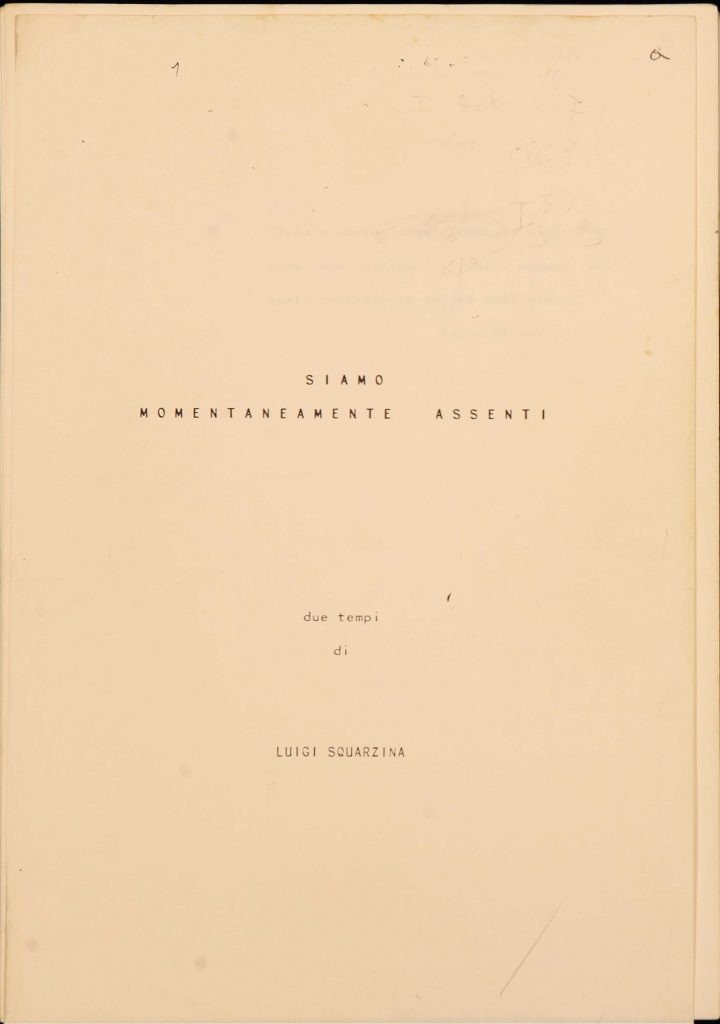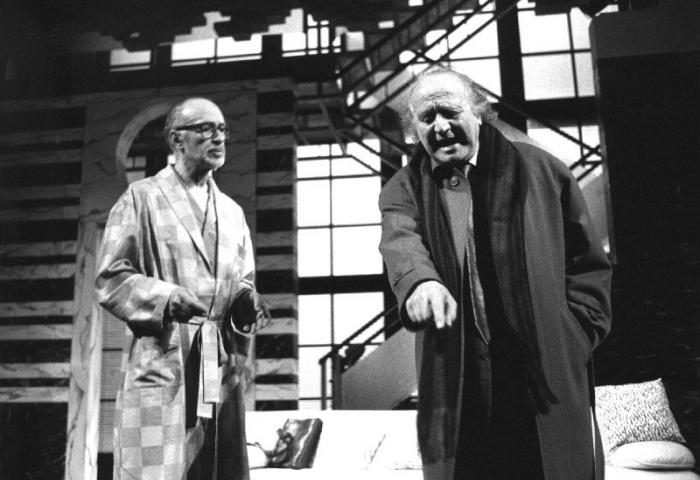Debutto: Milano, Piccolo Teatro, 5 maggio 1992
| Regia | Carlo Battistoni |
| Scene | Ezio Frigerio |
| Costumi | Ottavio e Rosita Missoni |
| Musiche | Fiorenzo Carpi |
Personaggi e interpreti
| Gianluca | Mattia Sbragia |
| Giulio | Franco Graziosi |
| Cristina | Claudia Giannotti |
| Alberta | Giulia Lazzarini |
| Effe Effe | Renato De Carmine |
| Mizzi | Corallina Viviani |
Scritta nel 1990, è la sua ultima commedia. Ottiene il premio IDI nel 1991. Viene messa in scena al Piccolo di Milano nel maggio 1992 per la regia di Carlo Battistoni, le scene di Ezio Frigerio, i costumi di Ottavio e Rosita Missoni e le musiche di Fiorenzo Carpi. La storia: Giulio e il figlio Gianluca tornano a casa pieni di dolore dopo il funerale di Alberta, moglie e madre. Mentre ne rievocano la figura con grande struggimento appare Alberta imperturbabile che ricomincia a comportarsi come se nulla fosse successo. Parla con il figlio sollecitandolo a riconciliarsi con la moglie Mizzi, con il marito, accogliendo con serenità la confessione dei suoi tradimenti e confessando il suo, e con il regista Effe Effe per dargli suggerimenti per il suo prossimo film. Infine, di fronte allo sbalordimento dei suoi interlocutori Alberta svela il mistero del suo ritorno sulla terra: ha fatto un accordo con la morte prendendo il posto del marito che, invece, sarebbe morto e per di più ha ottenuto dodici ore di vita. Pur aderendo ancora una volta alla realtà nella rappresentazione ironica della famiglia borghese e non rinunciando alle sue convinzioni sulla funzione del teatro, Squarzina in questa commedia mette al primo posto il lirismo, l’elegia dolce e malinconica. Il dilemma non è più tra l’esistenza e la storia, ma tra la vita, la morte e l’amore. L’uomo perennemente razionale ridiventa poeta, torna alla sua passione antica e ricomincia a parlare d’amore.
 “Il mio dramma Siamo momentaneamente assenti trattava la spiegazione dell’inspiegabile, cioè di ciò che non è volontario, la morte appunto, inteso come atto di volontà. Non è un gesto negativo come il suicidio, ma un atto che prende il posto del destino. Questo confronto con la morte si mescola al sogno di un artista che vorrebbe parlare proprio di tale questione, ma, avendo avuto poco successo commerciale negli ultimi tempi, non trova produttori disposti a finanziarlo, se non trasformando il progetto in una operazione scandalistica”.
“Il mio dramma Siamo momentaneamente assenti trattava la spiegazione dell’inspiegabile, cioè di ciò che non è volontario, la morte appunto, inteso come atto di volontà. Non è un gesto negativo come il suicidio, ma un atto che prende il posto del destino. Questo confronto con la morte si mescola al sogno di un artista che vorrebbe parlare proprio di tale questione, ma, avendo avuto poco successo commerciale negli ultimi tempi, non trova produttori disposti a finanziarlo, se non trasformando il progetto in una operazione scandalistica”.
Luigi Squarzina
Tratto da L. Colombo e F. Mazzocchi (a cura di), Luigi Squarzina e il suo teatro, Roma, Bulzoni Editore, 1996, p. 321
Si ringrazia il Piccolo Teatro di Milano per la concessione dell’utilizzo del materiale fotografico.

